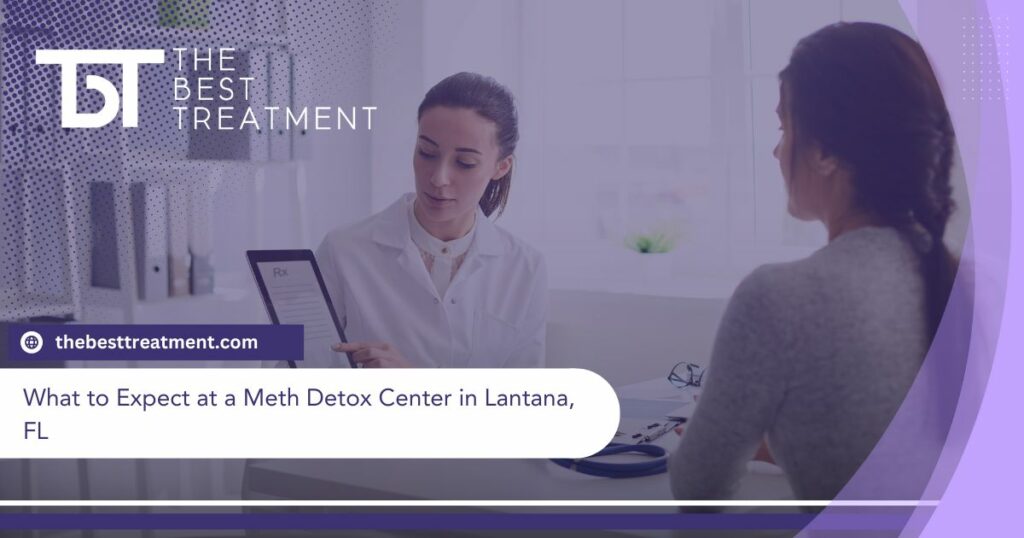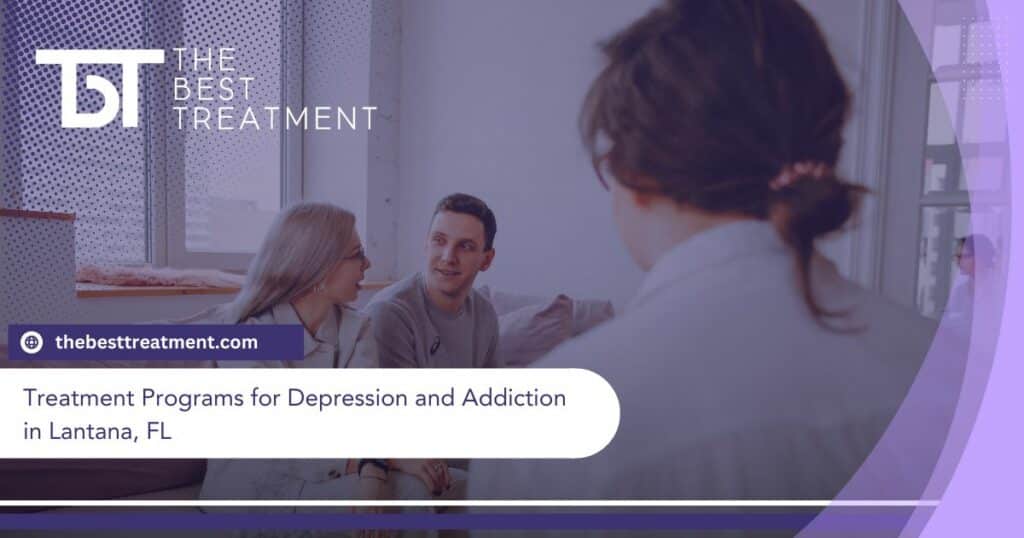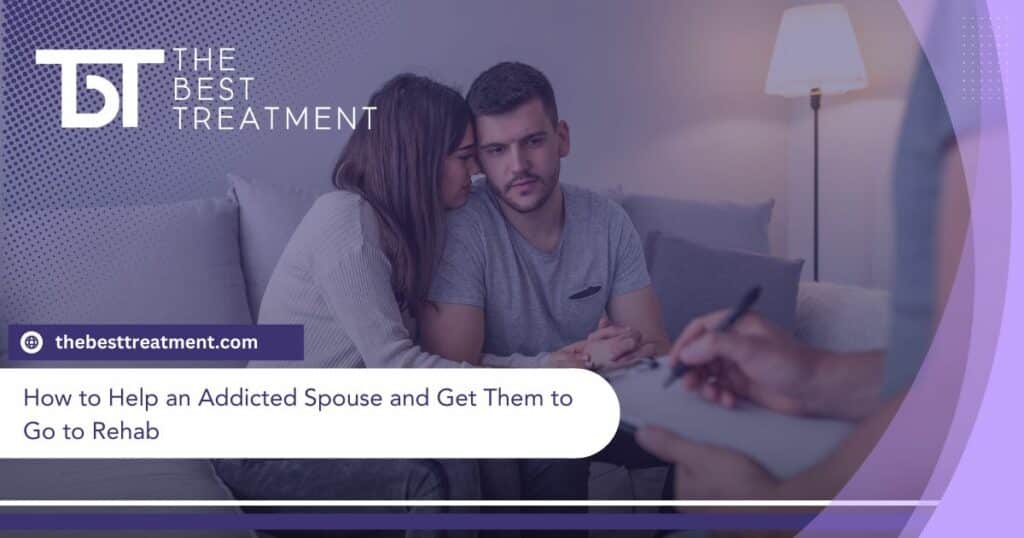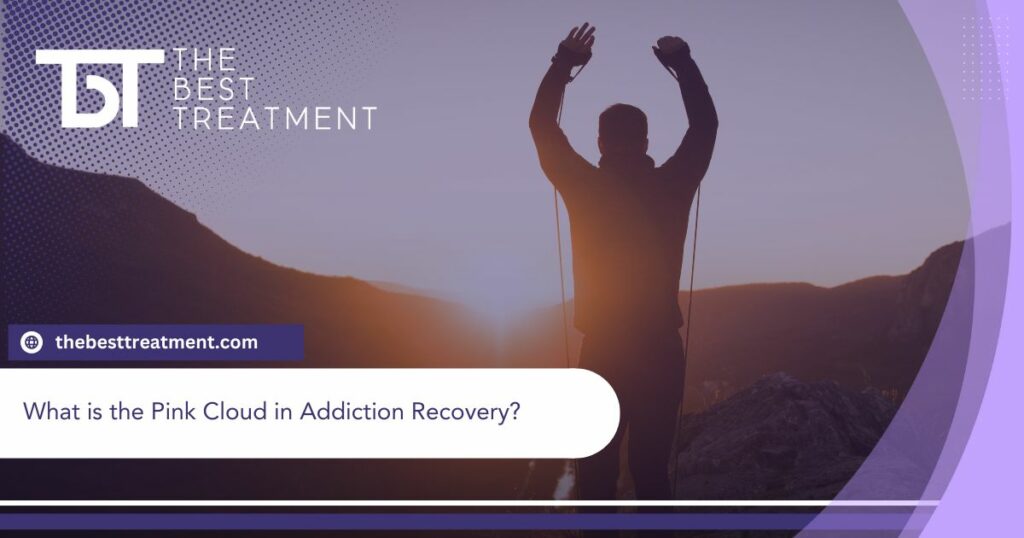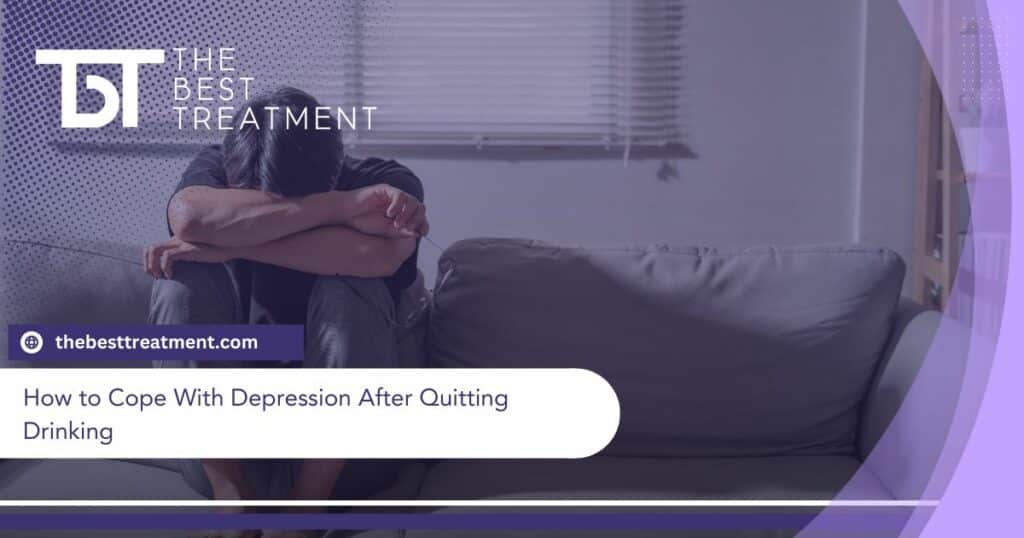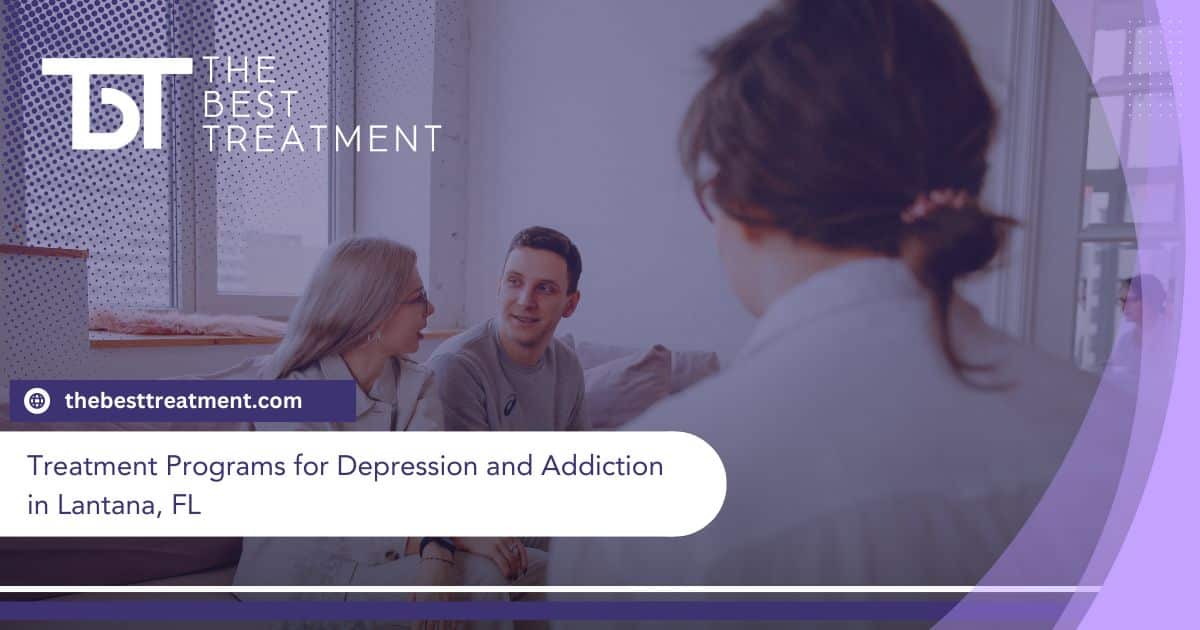Table of Contents
Navigating the complicated landscape of depression and addiction can be daunting, but when you understand the treatment options available for co-occurring disorders, it’s a critical step toward recovery.
When depression and addiction happen together, they make a challenging cycle requiring specialized care to address both conditions at the same time.
In this article, you will learn:
- About depression and addiction
- How depression and addiction are treated
- What to expect during treatment
- The benefits of an integrated approach
If you or a loved one are looking for treatment for depression in Lantana, please reach out to The Best Treatment today to discuss your treatment options.
The Relationship Between Depression and Addiction
There’s a complex relationship between mental health and addiction that’s bidirectional. This means each condition can contribute to the development and severity of the other.[1]
Having a mental condition like depression, anxiety, or bipolar disorder can increase the risk of substance abuse, as people can use drugs or alcohol as a way to self-medicate symptoms. Conversely, using substances can make existing mental health conditions worse or trigger new ones because of brain chemical changes.
Specifically, when it comes to depression and addiction, it can be an especially challenging dual diagnosis.
People who struggle with depression could turn to substances to numb their emotional pain, improve their mood, or escape feelings of despair or hopelessness. This can mean temporary relief, but it then can ultimately make depression symptoms worse and lead to addiction.
Substance abuse influences brain chemistry and affects certain neurotransmitters that are a crucial part of mood regulation. The changes can lead to or worsen depressive symptoms, creating a cycle where depression drives substance use and in turn, substance use intensifies depression.
About 16% of people with depression have an alcohol use disorder and 18% have a drug use disorder.[2]
Both depression and addiction can cause changes in behavior, including social isolation, neglecting responsibilities and engaging in risky behaviors. These can further isolate a person, limit their support network and make recovery more challenging.
Genetics can predispose a person to both depression and addiction, and environmental factors like adverse childhood experiences, stress and trauma can contribute to the onset of both disorders.[3]
Because of how intertwined depression and addiction can be, there are unique challenges, including difficulties in making an accurate diagnosis of each condition. Symptoms overlap, so a mental health professional has to do a comprehensive assessment to identify the presence and extent of both disorders.
Both mental health issues and addiction also carry stigma with them, which can discourage someone from getting help.
Dual Diagnosis Treatment for Depression and Addiction
Dual diagnosis treatment is an integrated approach addressing both a mental condition and a substance addiction at the same time. Depression and addiction are examples of co-occurring conditions, and dual diagnosis treatment is comprehensive to address both issues at the same time.
This treatment approach acknowledges the complex interplay between mental health and substance abuse, ensuring neither condition is treated in isolation.
How Dual Diagnosis Treatment for Depression Works
The first step in dual diagnosis treatment for depression and addiction is a thorough assessment that mental health and addiction specialists perform. The assessment evaluates how severe both disorders are and the extent of their impact. It also includes a detailed review of medical history, substance use history and psychiatric evaluations.
Based on that assessment, a personalized treatment plan is developed and tailored to address individual needs, taking into account specific depression symptoms and patterns of substance use. The treatment plan usually includes a combination of interventions and therapies that address both conditions.
These integrated therapies can include:[4,5]
- Psychotherapy to manage cravings and prevent relapse. Examples of evidence-based psychotherapies to treat both depression and addiction include cognitive-behavioral therapy and dialectical behavior therapy.
- Medication management can include anti-anxiety or antidepressant medicine to manage depression symptoms. For substance dependence, medications like buprenorphine, disulfiram and naltrexone may be used.
- Behavioral therapies, such as contingency management and motivational interviewing, can be part of treatment to encourage positive behavior changes and treatment adherence.
- Support groups and peer support participation. Support groups can include 12-step programs like Alcoholics Anonymous (AA) and Narcotics Anonymous (NA) or dual recovery programs that provide a sense of community. These groups allow for sharing experiences, gaining insight, and receiving encouragement from others in similar situations.
- Also part of many dual diagnosis programs are holistic treatments like mindfulness, meditation, yoga, and nutritional counseling. Holistic therapies promote well-being and address the emotional and physical aspects of recovery.
- A big part of dual diagnosis treatment is the development of a robust aftercare plan that may integrate ongoing therapy, support group attendance and strategies to manage stressors and triggers that can lead to relapse.
The benefits of dual diagnosis treatment approaches are extensive and include:
- Comprehensive care: When both depression and addiction are addressed at the same time, dual diagnosis treatment gives a more effective and holistic approach to recovery. Integrated care reduces the chances of one condition worsening the other, ensuring all aspects of individual health are considered.
- Improved outcomes: Individuals who receive dual diagnosis treatment in Lantana, FL frequently experience better outcomes than those receiving treatment for just one condition alone. Integrated treatment helps reduce depression symptoms, decrease substance use and improve overall function.
- Enhanced coping skills: Dual diagnosis treatment can equip an individual with coping strategies and tools for managing both depression and addiction challenges. A dual focus helps build resilience and navigate the conditions’ complexities.
- Reduced relapse risk: Treating both conditions concurrently reduces the relapse risk for depression and addiction. Effective depression management can reduce the urge to self-medicate with substances while addressing addiction prevents depressive symptoms from worsening.
- Holistic healing: As mentioned, dual diagnosis treatment emphasizes a holistic approach to addressing recovery’s emotional, physical and psychological aspects. Comprehensive care promotes well-being, helping individuals live fulfilling and balanced lives.
- Supportive environment: During an integrated treatment program, individuals are in a supportive environment where they connect with peers who understand what they’re going through. The sense of community fosters accountability, motivation, and encouragement.
Treatment for Depression and Addiction in Lantana, FL
Dual-diagnosis treatment is needed for people struggling with depression and addiction. Understanding and addressing the related challenges of these two conditions requires a comprehensive approach. With the right support and a commitment to integrated care, people can break free from the cycle of depression and addiction.
To learn more about our depression and addiction treatment programs in Lantana, Florida or to get started with a confidential, risk-free assessment, please contact us today.
References:
- National Institute of Mental Health: Substance Use and Co-Occurring Mental Disorders
- National Institute of Health: Mood Disorders and Substance Use Disorder: A Complex Comorbidity
- Science Direct: Chapter Six – Depression and substance use disorders: Clinical comorbidity and shared neurobiology
- AMA Journal of Ethics: Recognition and Treatment of Depression
- JAMA Network: Treatment of Adult Depression in the United States
Medically Reviewed: September 25, 2019

All of the information on this page has been reviewed and verified by a certified addiction professional.





